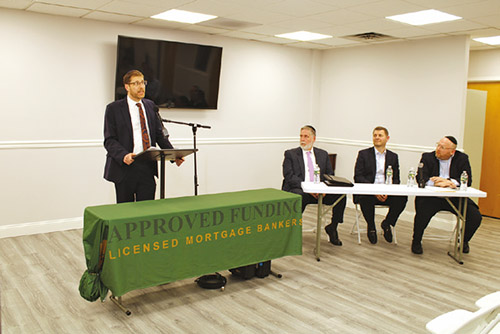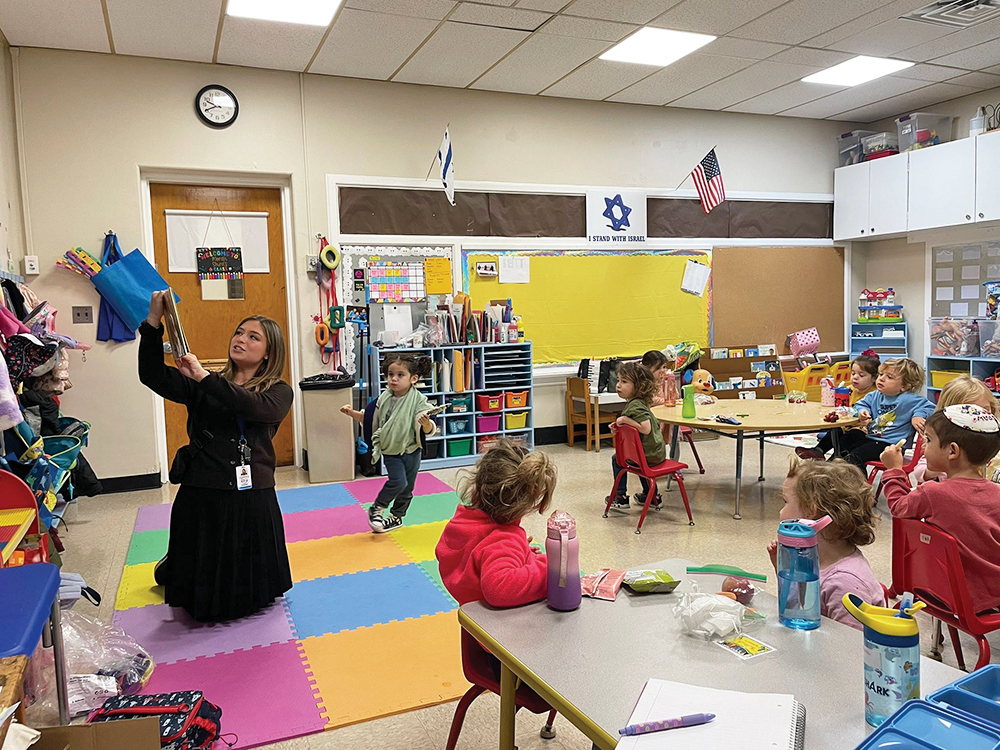

On Tuesday, June 6, approximately 75 community members gathered to hear RIETS Rosh Yeshiva Rabbi Jeremy Wieder speak about the economic pressures facing the Orthodox community. A recent guest on the “Kosher Money” podcast with an episode that received more than 30,000 views in a month, the longtime Teaneck resident offered a bleak perspective on the financial future of our community, which he thinks offers a negative message and legacy for the next generation. Rabbi Wieder spoke at a roundtable organized and hosted by Approved Funding’s Shmuel Shayowitz, and co-hosted by Doug Dubitsky, a financial advisor with CFS/Certified Financial Services, and Moshe Kinderlehrer, co-publisher of The Jewish Link.
Before introducing a broad-based plan for communal payment of yeshiva day school tuition, Rabbi Wieder began his speech by introducing the first of two connected subjects: materialism, as the “Chanukah Problem.” In the Chanukah story, the Greeks were not trying to physically destroy the Jewish People. Rather, their goal was to prevent Jews from practicing Judaism and to destroy the community’s spirituality. Rabbi Wieder similarly described materialism not as a threat to our community’s physical existence but as a threat to its spiritual existence.
The second challenge, the high cost of yeshiva tuition, is one that Rabbi Wieder considers to be an existential threat to the community’s lifespan. He called this issue the “Purim Problem,” referring to Haman’s attempt to physically destroy the Jewish community.
Addressing the first challenge, Rabbi Wieder explained that there are many people who can financially afford to live a materialistic lifestyle, but being able to do so does not make that lifestyle appropriate. He talked about the value of kedusha, holiness, and described it as “one of the central Torah values” that should “govern everything that we do.”
“I can have all the money in the world, but that doesn’t mean it’s appropriate for me to live in a certain kind of house, drive a certain kind of car, take a certain kind of vacation, etc,” he said. “It can be a violation of kedusha even if it’s not technically prohibited.”
In the context of materialism, Rabbi Wieder also discussed the concept of tzniut, modesty. He referred to tzniut as a “central value” in Judaism and noted that while it is mostly discussed in the context of women’s dress, that “is the tiniest part of tzniut.” He said that “tzniut applies to men and women equally, in dress, in comportment, in how one spends their money and their time, and in what they show to other people.” He then suggested that if people choose to spend extravagantly, at the very least it should be kept private, and encouraged listeners not to post pictures of, or flaunt, fancy trips, even if they can afford to go on them.
In addition, Rabbi Wieder suggested that before making a big purchase or spending an outsized amount on a fancy simcha, people should consider their motivations and think about “how much is because we really want it, and how much is signaling to other people what we have.” As a final emphasis on the importance of tzniut, Rabbi Wieder described how damaging conspicuous consumption is to the community, for individuals who engage in it, but especially for those who can not afford to do so.
As he segued to the topic of high tuition costs, Rabbi Wieder noted that while the issue of materialism is very important in our community, ultimately, individuals have control over their spending choices. He acknowledged that it may be hard, but said that anyone has the option of choosing to live in a smaller house or drive a cheaper car. He then explained that the high cost of tuition is not in the control of individuals, and can only be addressed on a communal level.
Before proposing his solution to this issue, Rabbi Wieder further described what he considers to be the root of the problem, saying that the responsibility of funding our schools is on the community, and that “our community is failing at this.” He suggested that this failure is largely due to the pay-as-you-go model that the community has adopted, and argued that the American model of funding public schools with taxes that every family in the community pays, whether or not they have children enrolled in the schools, is the “fundamentally correct way,” and that this model is “the Torah way of doing things.”
As a solution to the high cost of yeshiva tuition, Rabbi Wieder suggested “a broad based funding model.” Under his plan, every member of the community would be responsible to pay a certain amount of money to local schools each year. He is confident that this is the “correct approach from a Torah perspective” and does not think that “any other approach is going to work.”
He stressed that this funding plan is important because the extremely high tuition costs currently in place are likely to ultimately create a very narrow and exclusive yeshiva community with members working only in select fields that offer salaries high enough to pay these significant expenses. “I think the only way our community is really going to survive in a meaningful way is to do the right thing, which is to adopt the Torah model,” Rabbi Wieder said.
Anticipating some concerns people may have regarding his proposal, Rabbi Wieder preemptively discussed a couple in his presentation. Regarding the issue of convincing community members to adopt this model, Rabbi Wieder said that “what has to happen first is the community has to be educated.” Right now, he continued, yeshivas teach nothing about financial literacy, nor do they provide any Torah education on the philosophy of money, and this needs to be changed. Rabbi Wieder specifically addressed the families who after years of paying tuition were finally done, knowing that they would likely be the hardest to convince. For them, Rabbi Wieder had three arguments. First, he suggested that the fact that the community used the wrong funding model in the past is not something that should prevent it from fixing the problem going forward. Next, he reminded everyone of our obligation to do God’s will and what is right according to the Torah. Lastly, he urged everyone to think about the kind of community their children would have to live in if nothing is done to address this issue.
As a practical next step, Rabbi Wieder said that he is meeting with community rabbis and leaders and asking them to speak about these issues. He believes they can help the community understand their responsibility and the necessity for adopting this type of plan. He also asked listeners to function as ambassadors and explain to their friends and neighbors the importance of adopting this funding model.
Following Rabbi Wieder’s presentation, panelists Doug Dubitsky and Shmuel Shayowitz reiterated the need for financial education in the community. Dubitsky spoke about the lack of financial literacy that he sees in the community in his professional capacity, and Shayowitz added that, from his professional vantage point, the issue has led to a serious disconnect that he has seen between income and spending levels in the community. As financial professionals in the community, both agreed that the issue of financial literacy is one that must be addressed.
The full speech is available on the Jewish Link Youtube channel and the shortened link is here: https://rb.gy/d4ahy.
Those interested in providing feedback on this or other financial communal issues are invited to send letters to the editor to
[email protected].
Shira Adler is a summer intern at The Jewish Link and a rising junior at Stern College.












